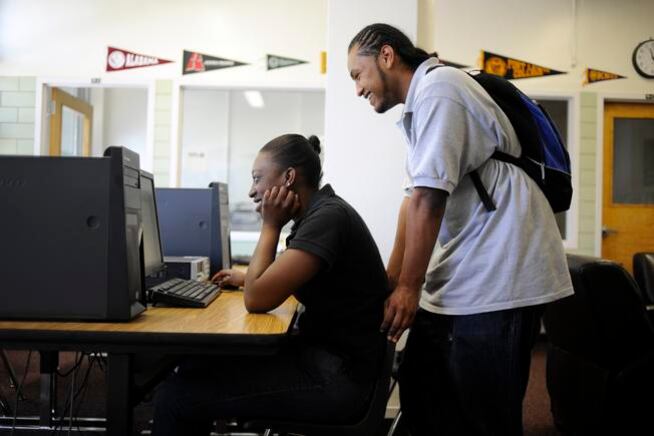More Colorado students will get help filling out critical federal financial aid forms under a new law that aims to ultimately distribute more aid for college.
The law intends to offer students more information about the benefits of completing financial aid forms, a key step in opening up federal grants and scholarships.
Colorado ranks among the bottom 10 of states in the percentage of students completing the Free Application for Federal Student Aid, commonly known by its acronym, FAFSA. That means they leave an estimated $30 million in financial aid on the table every year, even as surveys find that concerns about cost are a major reason students don’t pursue higher education.
This year, a working group of 20 experts recommended increasing the state’s FAFSA completion rate. Lawmakers adopted several of their suggestions. The report calls for nearly doubling the FAFSA completion rate to 80%, from 45% — or to at least move into the top 10% of states in the measure. The report also calls for someday making FAFSA completion a graduation requirement.
This year’s House Bill 22-136 will create a directory of resources for educators to share, boost training in helping students apply for financial aid, and require schools to notify students about financial aid when mapping out high school plans.
State Rep. Cathy Kipp, a Fort Collins Democrat who sponsored the legislation, said it aims to reduce the millions that Colorado students leave on the table each year.
Kipp said that money is “sometimes the difference in whether students can pursue post-secondary education or not.”
In states that require FAFSA completion as part of graduation, the percentage of students doing so has spiked. However, the requirement can be costly to effectively implement and can burden educators.
Renae Bellew, of the Denver Scholarship Foundation and a member of the working group, said the its recommendations called for lawmakers to support educators with a goal to make a FAFSA graduation requirement by 2025.
“The committee wanted to provide school districts with the support that they need in training and resources and people to do it right,” Bellew said. “We don’t want to put the students or school districts in a bad place.”
Here’s what will change statewide related to financial aid.
Grants to help districts provide more information to parents and students
The legislation will provide $1.13 million to districts over three years to design communication with parents and students about the benefits of completing financial aid forms.
That might mean expanding help with the financial aid process or training teachers on how to help students.
A financial literacy resource bank
Consider this an encyclopedia for teachers.
The Colorado Department of Higher Education will get $275,000 to create detailed information for teachers to use to talk to students about how to get money for college and which college degrees or training leads to jobs in high-demand fields. The state intends to connect students at an earlier age to college and career options.
Money for teacher training
The Colorado Department of Education will give teachers a $500 stipend if they complete training on how to improve student financial aid application completion rates.
An easier application for state financial aid
In 2024, the state will roll out a new state financial aid application that will look more like the federal form.
More support to talk to students about life after high school
A state team must create training on how to talk to students about post-graduation plans. The team must also provide training at workforce centers and correctional facilities and to foster youth.
The inclusion of financial aid in student career and academic plans
As part of students’ career and academic plans, teachers and counselors must teach students and families about the availability and importance of completing federal and state financial aid applications.
Jason Gonzales is a reporter covering higher education and the Colorado legislature. Chalkbeat Colorado partners with Open Campus on higher education coverage. Contact Jason at jgonzales@chalkbeat.org.







